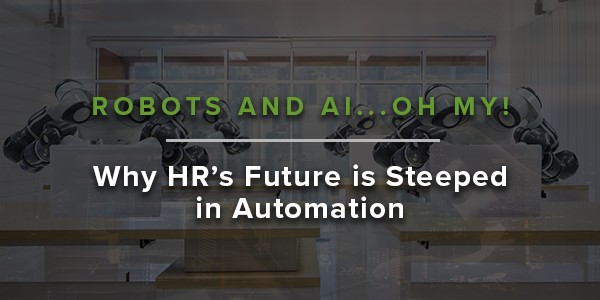 Robots answering common client questions. A computer program that tracks applicants from first touch through onboarding. Taking employee temperatures as they walk through the door.
Robots answering common client questions. A computer program that tracks applicants from first touch through onboarding. Taking employee temperatures as they walk through the door.
All of these sound like they would be part of a 1990’s sci-fi movie, right? The truth is, they’re happening right here in 2020! Artificial Intelligence (AI), Bluetooth technology, and mobile applications are becoming increasingly essential and mainstream every month. Not knowing how they can assist HR can cause your department to falter in progress.
Human Resource professionals must acknowledge and understand the options in front of them to manage and serve their organization’s employees effectively. Embracing AI to help offers big advantages. Not convinced? Here are 6 reasons why HR’s future is steeped in automation.
Expect to Do More with Less
The amount of information, tasks, and goals HR is involved never decreases. This makes finding better ways to perform tasks in less time essential. AI can empower HR by taking the more mundane, tedious parts of the position off the schedule, freeing up your time to focus on the broader, more transformational picture that the C-Suite cares about.
Smart Actions Are Best
HR thrives on creating solid connections with job candidates, interviewees, new employees, and the company’s OG’s. Scalability is key in managing job candidates in a way that feels personal but is still efficient. Smart digital forms provide a way to do this. Instead of requiring job seekers to enter the same information multiple times, smart forms save their data and add it across the various paperwork. This might not sound like a big deal, but remember, we are dealing with a “swipe right” society where one simple click too many drives your audience away.
Fair and Objective
AI tools can analyze applicant information and “weed out” the applications that don’t offer the skills, education, and other qualifications the position requires. Automation doesn’t notice a job candidate’s age, race, religion, handicap, or any other protected-class information. An objective process is a better, stronger process.
Automation Gives Candidates the Warm and Fuzzies
At first, AI may sound like an out-of-touch, sterile experience. But it’s not. Providing ways for job candidates and employees to ask questions, receive answers fast, and save time are ways to increase their satisfaction with their experience. Chatbots, for example, can gather information HR can use to measure the success of their recruiting, onboarding, and employee engagement efforts. Metrics like these can help HR know what to do to keep morale high, improve productivity, and reduce turnover.
Learning Has Never Gone Out of Style
Many employees value learning as much or more than a pay increase, especially Millennials. HR will be able to leverage AI learning to increase opportunities for employees to hone skills and expand their knowledge in both technology and other aspects of their current or aspiring roles. Using automation to match the education an employee needs to their specific positions and to lay out at-your-own-pace training will be a data-driven way to create promising career paths and increase employee satisfaction.
Harnessing Workforce Analytics Is Crucial
Problem solving is one of HR’s most important jobs, and AI will be integral in reaching smart solutions. Real-time analytics, reviewing the data regarding employee behavior and its impact on productivity, and the ability to identify employee trends will assist HR in making good, proactive decisions about workforce strategies that mitigate and minimize issues.
HR professionals shouldn’t be intimidated by robots and artificial intelligence. After all, robots are never going to be smart enough to take over your jobs. They can, however, function as a valuable tool that will help HR do their jobs better and more efficiently, create opportunities for a more successful candidate experience, and help build new ways to increase employee morale and engagement. In short, robots are good friends to have!
Other posts you might be interested in
View All Posts7 Smart 2019 Background Screening Resolutions HR Should Make NOW
Read More
Why HR Should Expect Better Background Screening Practices
Read More
